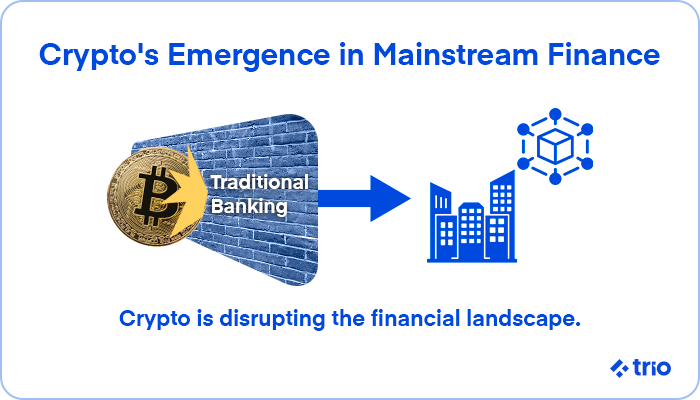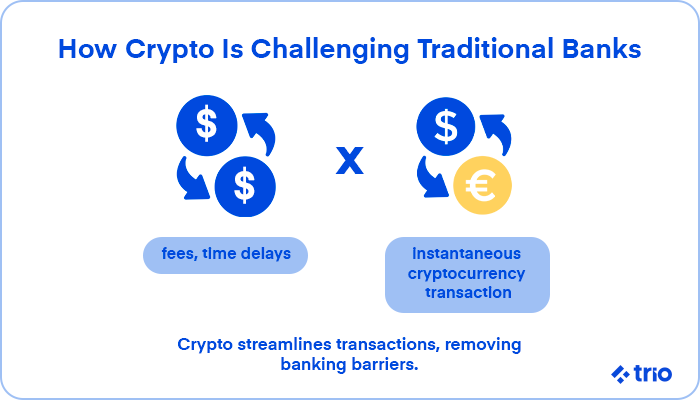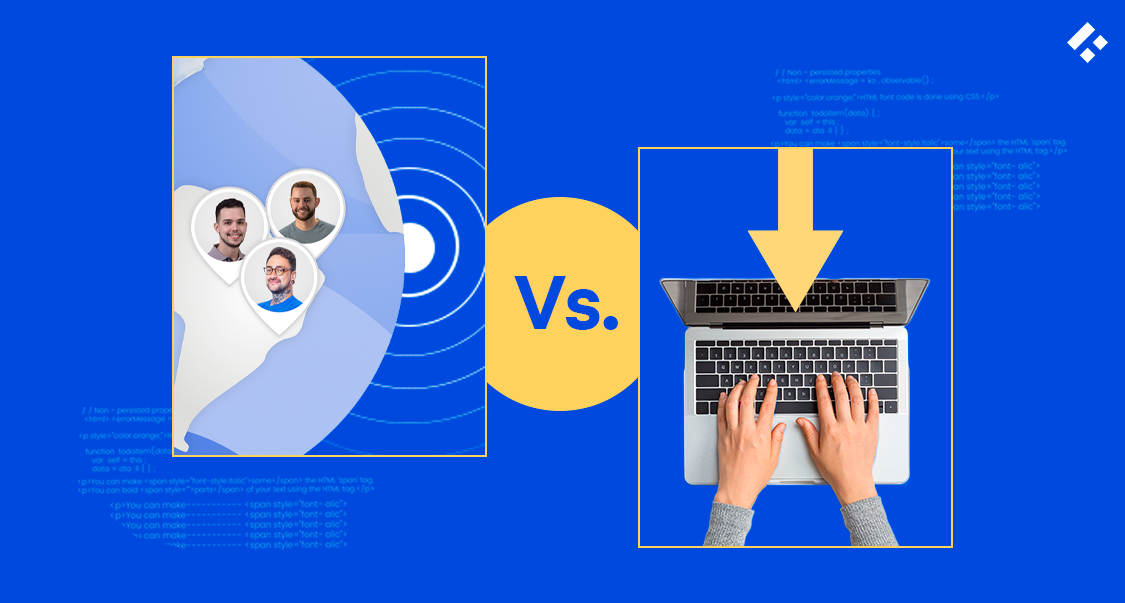Cryptocurrency is no longer a fringe interest; it has steadily embedded itself into mainstream finance, creating a seismic shift in how we think about money and transactions.
Think back to 2009, when Bitcoin was born, a niche digital currency that sparked curiosity but little else. Fast forward to today, and crypto disrupts entire industries, especially fintech or financial technology services, and banking.

For established tech companies, the question isn’t if crypto will impact banking but how fast and in what ways it will change the game.
Cryptocurrencies have opened new doors for financial institutions, but are also forcing them to rethink how they operate.
Here at Trio, we understand the evolving needs of the fintech sector and offer the development expertise to help your business navigate this digital revolution with scalable, secure, and custom-built solutions.
We don’t do everything; we just do fintech, allowing us to develop a thorough understanding of what is happening in the markets and to adapt, in real time, to any trends or new industry expectations that might emerge. Our developers know what they are doing, and they are given time to make sure that continues to be the case.
Our solutions can be incredibly cost-effective thanks to our ability to implement nearshore or offshore outsourcing and staff augmentation, even helping our clients with onboarding.
This allows you to assemble a dedicated team with the best talent from Latin America, Africa, or Eastern Europe, within as little as 24 hours in some instances, allowing you to take advantage of any emerging opportunities.
How are Cryptocurrencies Challenging the Traditional Banking Sector?
Cryptocurrencies are fundamentally challenging how traditional banks work. Crypto is not just faster than traditional banking, but in many cases also cheaper, making it the obvious choice for a large number of the traditional banking sector’s previous clients.
If you’ve ever tried sending money internationally, you know the frustration: high fees, long wait times, and complex processes.
But with cryptocurrencies, these hurdles vanish.
Blockchain-powered transactions are nearly instantaneous, cost a fraction of what traditional services charge, and don’t require intermediaries like banks.
Cryptocurrency transactions in 2022 could have saved users and businesses an estimated $74 billion in credit card fees, according to Coinbase.

That’s a massive shift, and it’s no wonder fintechs are jumping on board.
Our experienced developers can help fintech companies build the infrastructure needed to integrate cryptocurrency payment gateways, allowing you to remain agile and competitive in this ever-changing market.
What Role Does Blockchain Technology Play in Banking?
While it may have taken banks some time to adapt to crypto and blockchain technology, the engine behind cryptocurrencies, they have been able to make use of them in ways that have ultimately been a game-changer for even legacy banks.
Global powerhouses like JPMorgan and Goldman Sachs have launched cryptocurrency services, and Central Banks are even testing their own digital currencies.
While banks were initially skeptical, many are now taking steps to integrate cryptocurrencies into their offerings. A lot of the use cases of blockchain and cryptocurrency have been related to cross-border payments and real-time settlement.
These actions indicate that banks are waking up to the potential of crypto, though the transition isn’t without challenges.
For established companies looking to jump on this trend, it is incredibly important that you connect with developers who are able to ensure that your new offerings are both compliant and user-friendly solutions. If built correctly, you will end up with products that ease the integration of digital currencies into existing infrastructures.
But why would you want to use them in the first place?
Enhances Transparency, Security, and Efficiency
Most banks use legacy software that was created some time ago, and rely on a bunch of intermediaries. While having outdated infrastructure isn’t always the end of the world, in the rapidly evolving world of banking, it can result in delays, inefficiencies, and high service charges.
By creating a transparent and secure ledger, blockchain reduces the risks of fraud, streamlines processes, and eliminates inefficiencies in how money moves.
Blockchain transactions are also borderless, permissionless, and not reversible, which may be ideal in some situations where these factors not only reduce operational costs, but also risks.
These benefits all become essential if you consider the increased adoption of digital assets around the world and the shifting user expectations that come along with that.
Used in Settlements, Audits, and Compliance
Blockchain-based international clearing and settlement systems can save banks up to $10 billion annually by 2030. A big part of this profit has been in the form of reduced reconciliation delays, cut overhead, and strengthened compliance protocols.
We know that many financial institutions are already exploring blockchain to automate processes, reduce reconciliation times, and enhance security within the financial system.
Many banks are beginning to use blockchain in real-time reporting instances, KYC (Know Your Customer) data sharing, and even smart contracts. By automating all of these functions, banks and other financial institutions not only benefit from increased accuracy and speed but also from a generally improved oversight.
This oversight is critical if you consider just how heavily regulated the fintech industry is.
How are Fintech Companies Adopting Cryptocurrency?
We’ve covered traditional banking, but what about the frontline of innovation, fintech companies? Many different fintech startups and established firms are making use of crypto.
Lending, Payments, and Wealth Management
As discussed, digital currencies have the potential to streamline various financial processes, and fintech software development is in a prime position to leverage these advantages.
Take remittances, for instance. Based on trends, we can probably predict that global remittance will continue to increase, and cryptocurrencies are reducing fees and speeding up transfer times for individuals sending money home. This is especially true in areas where access to traditional banking is limited or unaffordable to many of the individuals who live there.
Other use cases include smart contracts – automated, trustless agreements built on blockchain, which are used in lending, insurance, and even real estate. Fintech startups are also experimenting with crypto-backed lending platforms, digital investment tools, and decentralized insurance products.
Overall, we’re seeing an incredible expansion in what is available in the lending, payments, and wealth management sectors.
At Trio, we can help your fintech company find the right developers to integrate these advanced technologies into your mobile fintech solutions or other platforms, making sure they stay ahead of competitors.
Crypto Wallets and Payment Gateways
Crypto wallets and payment gateways are becoming essential parts of some fintech platforms as they allow users to buy, sell, hold, send, and receive all kinds of digital assets that conventional banks would not give them access to.
While these features aren’t yet commonplace, we expect to see growth as users express their desire for fast and secure access to their cryptocurrencies. The most successful platforms pay attention to what users need, whether that’s new features, UX, performance, or compliance.
Leading Fintech Companies Driving Crypto Adoption
Major fintech players like PayPal and Square are already ahead of the curve.
PayPal, for instance, allows users to buy, hold, and sell cryptocurrencies directly within their platform.
Meanwhile, Square has invested millions into Bitcoin and is developing innovative solutions for digital currency adoption.
Robinhood is another notable option. While the platform is targeted at those who want general commission-free trading, its crypto offerings are driving ownership among younger investors.
These companies aren’t just experimenting; they’re paving the way for smaller fintech firms to follow. They are playing a big role in the normalization of digital assets and, ultimately, the way that we handle money as a society.
With the expertise that we can bring to the table with our many years of successful outsourcing experience, even up-and-coming fintechs can integrate crypto features in their scalable mobile applications that rival those of industry leaders.
Why Early Adoption Matters
Early adopters are going to be able to reap the benefits of an increasing demand for systems that deal with digital assets. This not only means that they are going to get a larger client base while there’s less competition, but also that they are going to have a firmly cemented reputation once there are more options out there.
These early adopters are also likely to be better prepared as regulations change to formalize the position of cryptocurrency in our society.
Essentially, they are becoming the industry giants while everyone else falls more and more behind.
Central Bank Digital Currencies (CBDCs) and the Future
Central Bank Digital Currencies (CBDCs) are a digital version of a country’s regular currency. Much like the regular currency, it is issued and regulated by the central bank of that area.
Global Examples of CBDCs
Many countries are piloting Central Bank Digital Currencies (CBDCs) to utilize blockchain security while maintaining centralized control.
China’s digital yuan and Sweden’s e-krona are leading examples, showing that central banks recognize the future of money is digital. However, they don’t plan to replace cash outright just yet.
Nigeria has also launched its eNaira, while it seems like the European Central Bank and the U.S. Federal Reserve are still in discussions about their own digital currency options.
CBDCs won’t fully replace traditional money, but their coexistence will revolutionize payments and digital banking.
CBDCs vs Crypto
It’s similar to crypto, like Bitcoin, but only in its digital nature. While these other cryptocurrencies are decentralized, CBDCs are centralized and backed by the government.
These currencies combine the efficiency and security that blockchain provides with all the benefits of a digital currency.
CBDCs focus primarily on stability and complementing a country’s existing currency, rather than being something else entirely.
DeFi in Banking
DeFi has been mentioned a couple of times above. But what is it?
Essentially, DeFi is a new financial ecosystem that has been built on public blockchain networks and lets people get around using traditional banks.
How Removes Intermediaries
Decentralized Finance (DeFi) removes the need for any sort of traditional intermediary. Users no longer need to go through banks or brokerages, but instead use smart contracts and blockchain protocols for any transactions. This could be for peer-to-peer lending, but also just for the basic services that any online wallet may provide.
As they have started appearing, we have seen how DeFi platforms eliminate intermediaries like banks, allowing users to lend, borrow, and trade assets independently.
Opportunities for Fintech in DeFi
As of 2024, DeFi platforms hold over $200 billion in assets, and this number continues to grow as more users turn to decentralized alternatives.
If you are a fintech wanting to embrace DeFi, you will now be well-positioned to offer groundbreaking services to your customers, such as decentralized lending pools, tokenized investment products, or even yield-generating savings accounts.
All of this could give you a competitive edge
Security and Compliance Challenges with DeFi Solutions
The most important thing when working with DeFi is definitely security. If you want a developer to consult on secure mobile app development and other best practices, we might just have the right fit for you with a great team culture alignment.
Smart contracts are very difficult to change once they have been deployed, making them incredibly secure. However, there are other challenges that digital assets represent, like hacks, code exploits, and more, which could be costly to users directly.
Trust and auditing are incredibly important for these reasons.
Crypto and Fintech in Financial Inclusion
Cryptocurrency is a powerful tool for financial inclusion.
For millions of unbanked individuals around the world, crypto offers an alternative to traditional banking, providing access to services through nothing more than a smartphone.
How Does Crypto Improve Access to Financial Services?
By cutting out the need for a bank account, digital currencies empower people to send, receive, and store money, regardless of their location.
Cryptocurrencies also allow users to purchase goods and services without the need for traditional payment systems, further enhancing financial inclusion.
We can help fintech companies develop mobile-first platforms that cater to underserved populations, expanding access to financial services on a global scale.
What Role Do Cryptocurrencies Play in Global Financial Inclusion?
In regions where banking infrastructure is lacking, cryptocurrencies are bridging the gap.
From Kenya to Southeast Asia, people are increasingly using digital currencies to access financial services that were previously out of reach.
Since users don’t need a traditional bank account, they can also participate in the global economy, removing barriers previously created by country borders and differing regulatory bodies.
The Future of Cryptocurrency, Fintech, and Banking
Cryptocurrency is definitely here to stay. But, it might not be around quite as we know it in the near future. There are some major things happening right now that will greatly affect the interactions between crypto and fintech, as well as crypto and banking.
AI, Blockchain, and Tokenization
Along with blockchain and DeFi, artificial intelligence (AI), machine learning (ML), and big data are reshaping banking.
Recently, we have seen how AI and ML can enhance customer experiences, provide predictive analytics, and automate customer service, while big data allows financial institutions to make more informed decisions.
When combined with blockchain and digital currencies, these innovations have the potential to revolutionize banking as we know it.
With Trio’s help, you can integrate these cutting-edge technologies into your operations, utilizing our developers, who are adept in everything from Python to React.
Zero-Knowledge Proofs and Privacy
Privacy is a major concern for users. Regulatory bodies are also trying to step in. However, it is difficult to track what happens on decentralized platforms.
One of the biggest changes has been in zero-knowledge proofs (ZKPs), which let you verify a transaction or identity without giving you access to any personal data.
These proofs are being integrated into blockchain networks and fintech platforms in an effort to support general compliance, as well as to build user trust and increase security.
The Regulatory Landscape
Regulations have always been one of cryptocurrency’s biggest hurdles. However, while regulatory concerns may have slowed the growth of these kinds of digital markets, there is no denying that addressing these concerns is essential for growth.
The Securities and Exchange Commission (SEC) in the United States and the Markets in Crypto-Assets (MiCA) regulation in Europe are both increasing scrutiny of the crypto industry while bringing some much-needed clarity to the industry.
The important thing for companies right now is to keep a close eye on any developments, as many changes are sure to come in the near future.
With Trio’s support, they can stay at the forefront of these regulations and any other innovations happening in the fintech industry, allowing you to offer cutting-edge products and services that cater to an increasingly digital world.
If you need developers or want some advice on how to proceed with your project, reach out to us so that we can set up a free consultation.





